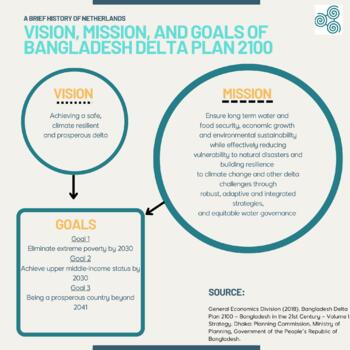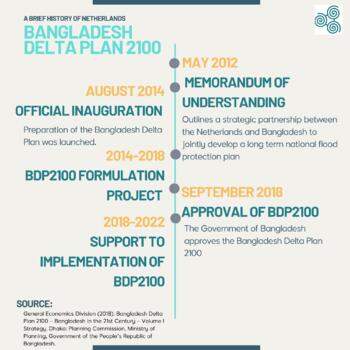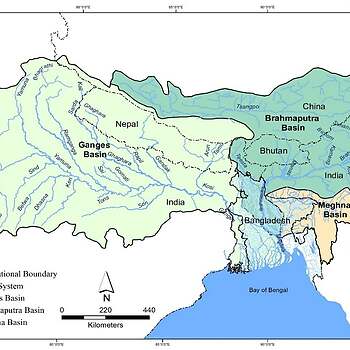Integrated Water Resources Management (IWRM) was not addressed in the Millennium Development Goals for 2015. This was corrected with the adoption of the UN Sustainable Development Goals SDGs in 2015. SDG 6 on “Clean Water and Sanitation for All” included an explicit Target 6.5 on implementing IWRM. The Netherlands has positioned itself to promote delta management as a tool to link SDG 6 and SDG 13 (Climate Action).
The Netherlands has always used its experience in water management to position itself as a centre for delta knowledge. Through policies such as recently the Netherlands International Water Ambition (NIWA), Dutch water expertise is actively promoted around the world as a unique way to combine economic productivity with sustainable development, linking it among others to SDGs 6 and 13. Its aim is more water security and flood safety for individuals and businesses, through improved river basin management and safer deltas. An important Dutch supported activity for Bangladesh in this context, was the formulation of the Bangladesh Delta Plan with 2100 as the time horizon.
The Bangladesh Delta Plan 2100: Bangladesh features the world’s largest river delta, formed by the junction of three great rivers – the Ganges, the Brahmaputra, and the Meghna. As the threat of climate change and rising sea levels looms large, proper planning and management of the delta is critical to the country’s economic growth and development. On the request of GoB, a ‘Bangladesh Delta Plan Preparatory Team’ (DPT) was fielded from July 2011 to June 2012 by the Embassy of the Kingdom of the Netherlands (EKN) in Dhaka. The DPT was funded through the Partners for Water Program of the Dutch Government, with a close linkage to the Water Mondiaal Program. A Memorandum of Understanding (MOU) was signed with GoB and GoN in May 2012 to jointly support the formulation of the Bangladesh Delta Plan 2100 (BDP2100). This comprehensive development plan was subsequently formulated by GoB, with the Bangladesh Planning Commission in the lead, and supported by a team of experts of various organizations in Bangladesh and the Netherlands. BDP2100 focused on sustainable water management, economic growth, environmental conservation, and enhanced climate resilience. The Bangladesh Delta Plan 2100 was approved by the Bangladesh Parliament in September 2018. Relevant information of Bangladesh Delta Plan can be found from the website of the Bangladesh Planning Commission and as an item in the Bangladesh topic timeline .
The background of the Dutch support to BDP2100 is further explained below:
The formulation of the Bangladesh Delta plan was based on the recent experience with safe deltas in the Netherlands. In 2007 a Delta Committee was appointed by the Dutch Government to formulate a long term strategic plan for water safety for the Netherlands especially in view of climate change, a reality that could not be ignored. The predicted sea level rise and greater fluctuations in river discharge compelled the Netherlands to look far into the future, and to formulate a vision on the long-term protection of the Dutch coast and its hinterland. Subsequently a Delta Act was approved (2012), the National Water Plan (2016-2021) was adopted, and a Delta program and Delta fund were established to implement the plan. This plan is a comprehensive set of adaptation measures to protect against the future climate impacts. This approach to a safe delta formed the basis of the program for safer deltas within the present International Development Cooperation, e.g. in Bangladesh and Vietnam.
Effective implementation of the Bangladesh Delta Plan aims to eliminate extreme poverty, create more jobs and sustain GDP growth above 8% until 2041, the target for Bangladesh to achieve the status of a high income country (Vision 2041). It will increase trade and navigational opportunities and strengthen food security. The Delta Plan will also help reduce urban migration by about 60%, coastal zone out-migration by 50%, and river area out-migration by 50%.
Delivering the BDP 2100 will require a combination of public and private funding from various sources. The current investment plan to support the implementation of BDP until 2030 is estimated to be 38 billion USD consisting of 65 infrastructure projects and 15 institutional and knowledge development projects.
Sources & Recommended literature
The Delta Plan in the topic timeline





